
No. 39 - Juliane Jarke, Gabriela Molina León, Irina Zakharova, Hendrik Heuer, Ulrike Gerhard – Beyond Participation: A Review of Co-Creation in Computing
Over the past ten years, co-creation has become a buzzword for the development, design, and provision of products and services across a range of domains: in the private and public sector, but also in the areas of art and research. As such, “co-creation is widely under- stood as practices where a design practice and one or more communities of practice par- ticipate in creating new desired futures” (Lee et al., 2018, p. 15). Beyond this very broad understanding of co-creation as a future-making practice involving different “communities of practice” (Lave & Wenger, 1991) there is no one definition about what it is and how it ought to be done; the origins of the term and areas of application are manifold, and so are the objectives of projects relating to co-creation. It may be employed as a process, agenda or tool (Lee et al., 2018) involving different groups of people, for example, older adults (Jarke, 2021) or citizens more broadly (Nambisan & Nambisan, 2013b).
About the authors
Juliane Jarke
Juliane Jarke, PhD, is a senior researcher at the Institute for Information Management Bremen (ifib) and Centre for Media, Communication and Information Research (ZeMKI) at the University of Bremen.Beforehand she worked at the Centre for the Study of Technology and Organisation at Lancaster University.Her research focuses on public sector innovation, digital (in)equalities and participatory design.
Gabriela Molina León
Gabriela Molina Leon is a doctoral researcher at the University of Bremen. Her research focuses on Interactive Data Visualization and Computational Social Science. She studied Computer Engineering and Human-Computer Interaction at Universidad Simón Bolívar (Venezuela), INSA Lyon (France) und Bauhaus-Universität Weimar (Germany).
Irina Zakharova
Irina Zakharova is a doctoral candidate at the Centre for Media, Communication and Information Research (ZeMKI) at the University of Bremen and a research associate at the Institute for Information Management Bre- men (ifib), Germany. Expanding on the notion of methods performativity, her doctoral thesis maps out the field of datafication scholarship with particular attention to research methodologies and concepts about datafication they produce.
Hendrik Heuer
Hendrik Heuer, Dr., is a senior researcher at the Institute for Information Management Bremen (ifib) and Centre for Media, Communication and Information Research (ZeMKI) at the University of Bremen. His focus areas are Algorithmic News Curation, Disinformation, and Accessibility. He studied Human-Computer Interaction and Ma- chine Learning in Bremen, Buffalo, Stockholm (KTH), Helsinki (Aalto) and Amsterdam (UvA).
Ulrike Gerhard
Ulrike Gerhard worked as a researcher at the Institute for Information Management Bremen (ifib) and Centre for Media, Communication and Information Research (ZeMKI) at the University of Bremen from 2016 to 2019. She has left academia and now works as a social worker.

